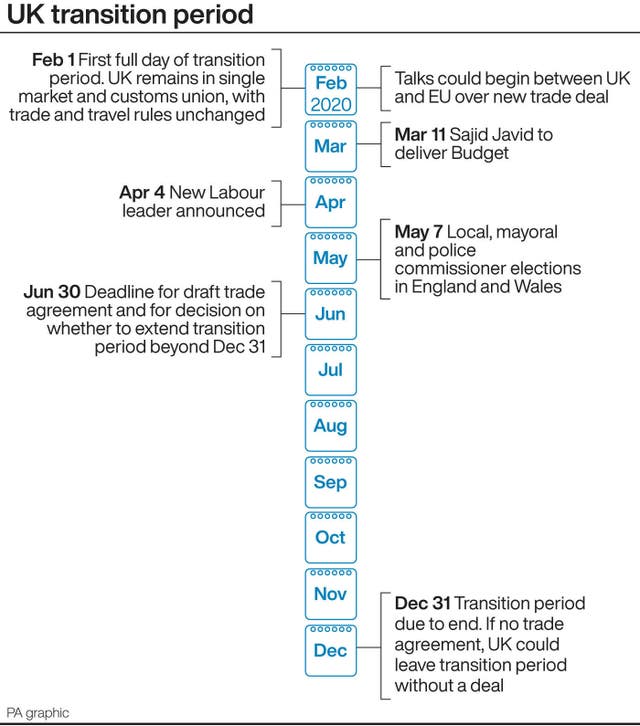
Brussels has demanded the UK continues to allow European Union fishing fleets access to British waters to strike a post-Brexit free trade agreement.
European ministers agreed to red lines for the negotiations in a meeting of the General Affairs Council on Tuesday, but the mandate has set the EU on a collision course with the UK Government.
The EU’s chief negotiator Michel Barnier told a press conference after the talks that fishing rights must be included in the deal or there “won’t be any agreement at all”.
He insisted there must be “robust, level playing field safeguards” to avoid “unfair competitive advantages” in social, environmental, tax and state aid matters.
🇪🇺EU ministers discussed relations with the 🇬🇧UK and adopted the negotiating mandate for the upcoming talks. Find out what else happened at today's #GAC Council: 🔎https://t.co/jdvonGglaa pic.twitter.com/DjECRASOM8
— EU Council (@EUCouncil) February 25, 2020
The mandate says the EU will seek to “uphold the existing reciprocal access to waters” and quota shares – a move that is set to cause tensions with Brexiteers and British fishermen.
“Let me remind you that most of the British processed fisheries products are traded, are exported, are sent to us, to the European market,” Mr Barnier said.
“So fisheries is part of a package as regards our trade relations, which are to be discussed, and that package is one you can’t break up. There will be no ambiguity at all around that.
“The trade agreement will be associated with a fisheries agreement and an agreement about a level playing field or there won’t be any agreement at all.”

Mr Barnier said the UK would be the EU’s third largest trading partner, but its proximity meant the rules “cannot be the same” as deals with Canada.
He warned that if there was to be any chance of a deal by the end of the year, there could be no “backtracking” by the UK on commitments made in the Withdrawal Agreement and the Political Declaration.
“If we want to build up a future relationship in the long term based on trust with the UK, we need to make sure that we have trust in the short term,” he said.
“This is predicated on the proper implementation of the Withdrawal Agreement that has already been signed and ratified.
“If you read the Political Declaration that was signed by Boris Johnson, that was negotiated by him and his team, we are not that far apart. In Political Declaration every single word counts.”
It follows reports that the Prime Minister has ordered his Brexit team to find ways to “get around” the Northern Ireland protocol which aims to avoid the introduction of a hard border on the island of Ireland.
Mr Barnier also said the negotiations would be “complex, demanding and difficult” but – in an apparent reference to Mr Johnson’s Get Brexit Done election slogan – urged both sides to “get this negotiation done and off to a good start”.
Downing Street said the Government wants the same treatment as other major economies who have signed trade deals with the EU.
4/5 We agree the UK’s trade with the EU is significant. The US’s is on the same scale – yet that did not stop the EU being willing to offer the US zero tariffs without the kind of level playing field commitments or the legal oversight they have put in today’s mandate.
— No.10 Press Office (@Number10press) February 25, 2020
A tweet from the Number 10 press office read: “The EU has respected the autonomy of other major economies around the world such as Canada and Japan when signing trade deals with them. We just want the same.
“We agree the UK’s trade with the EU is significant. The US’s is on the same scale – yet that did not stop the EU being willing to offer the US zero tariffs without the kind of level playing field commitments or the legal oversight they have put in today’s mandate.”
Mr Johnson used a speech in Greenwich earlier this month to announce that, once free of the EU’s Common Fisheries Policy, “British fishing grounds are first and foremost for British boats”.
The EU’s terms also include a controversial clause saying Britain should “return unlawfully removed cultural objects to their countries of origin” – an apparent reference to the Elgin Marbles.
Mr Johnson chaired a meeting of senior ministers on his Brexit committee earlier on Tuesday ahead of the publication of the UK’s negotiating position on Thursday.
The first round of talks is expected in Brussels on Monday, with a second round in London later in March.
British ministers are expected to seek a Canada-style agreement with zero tariffs, a proposal Mr Johnson and his Europe adviser David Frost have set out in speeches in recent weeks.
The tight time schedule for the talks remains an issue, with European ministers voicing concerns over the Prime Minister’s unwillingness to extend the deadline beyond December.
Mr Barnier said the bloc would not agree a deal “at any price” and warned that the deadline set by the UK could limit the scope of the agreement.
“In a very brief period, you can’t do everything, we will do as much as we can under pressure of time,” he said.


Comments: Our rules
We want our comments to be a lively and valuable part of our community - a place where readers can debate and engage with the most important local issues. The ability to comment on our stories is a privilege, not a right, however, and that privilege may be withdrawn if it is abused or misused.
Please report any comments that break our rules.
Read the rules hereLast Updated:
Report this comment Cancel